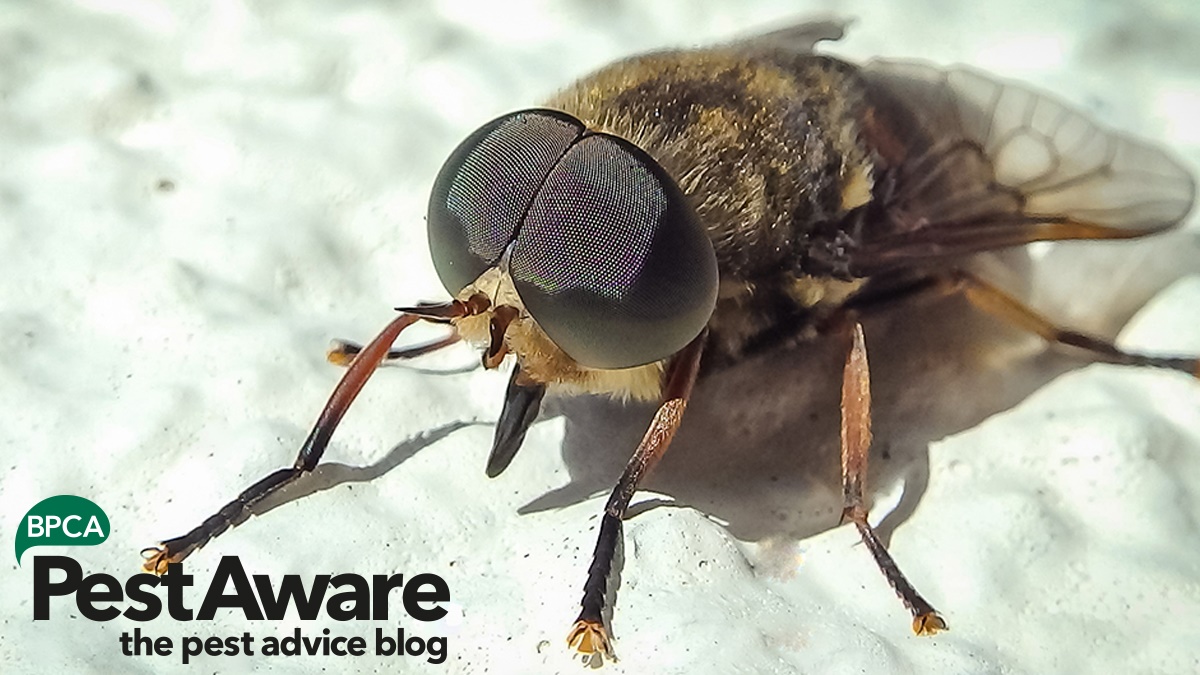Press release | PestAware
BPCA is issuing advice to the public to be pest aware following a reported increase in the number of fly bites.
The heatwave is being linked in the media to an increased number of bites and stings, particularly from horse flies.
BPCA has received enquiries from across the country – and says that rural areas are more likely to see an increase in numbers due to the presence of livestock, and access to standing water in troughs, ponds and marshes, which provide a food source and an environment to breed.

Is there an increase in biting insect this year?
Natalie Bungay, BPCA Field Officer, says that while the prolonged soaring temperatures mark a clear change in weather patterns for the UK, it is unclear what has caused the surge in insects.
One theory is that as the UK soaks up the rays, more people are outdoors than usual, increasing the opportunity for insects to bite and sting.
Natalie said:
“After a prolonged period of hot weather, or rather without cold and uncomfortable conditions for invertebrate pests, insect numbers may see an increase and infestations can develop if left alone.
“This, for some invertebrate species, is more likely to be rural locations, which will generally have more available breeding opportunities in ponds, marshes and other types of standing water.
Blood sucking insects
Natalie added:
“For blood sucking insects such as horse flies, the countryside also gives access to food sources, mainly cows and horses grazing in fields.
“Horseflies and mosquitos are interesting because they rely on aquatic larvae in wet and marshy areas, which won’t have necessarily dried up yet, even after the last four weeks of hot and dry weather conditions.
“We continue to receive enquiries and have noted coverage in the media, but there is nothing to substantiate a significant increase in activity.
“If members of the public do have an issue, we strongly encourage you to contact a BPCA member to get any problems resolved rapidly, and professionally.”
According to BPCA, the top five most common bites and stings are false black widow spider, mosquitos, horse flies, wasps and hornets.
Why are horse fly bites so painful
Natalie said:
“Horse fly bites are particularly painful because their main food source is livestock, which have a limited ability to move the fly away.
“This means they can take their food without having to worry about delivering a painful bite, as the animals are generally powerless to stop them.
“This is as opposed to mosquitoes, which extract blood through a painless bite.”
Advice to the public
BPCA advises the public to be pest aware and on their guard against bites and stings, by taking steps such as removing standing water from the proximity of their homes and areas of the garden used in the summer. Medical advice should be sought if problems emerge, such as swelling.
You can find a BPCA member to help with your pest problems through our Find a pest controller tool.
More information on the subject is available in a statement issued recently by BPCA on the changing pattern of summer pest behaviour.
Source: PestAware